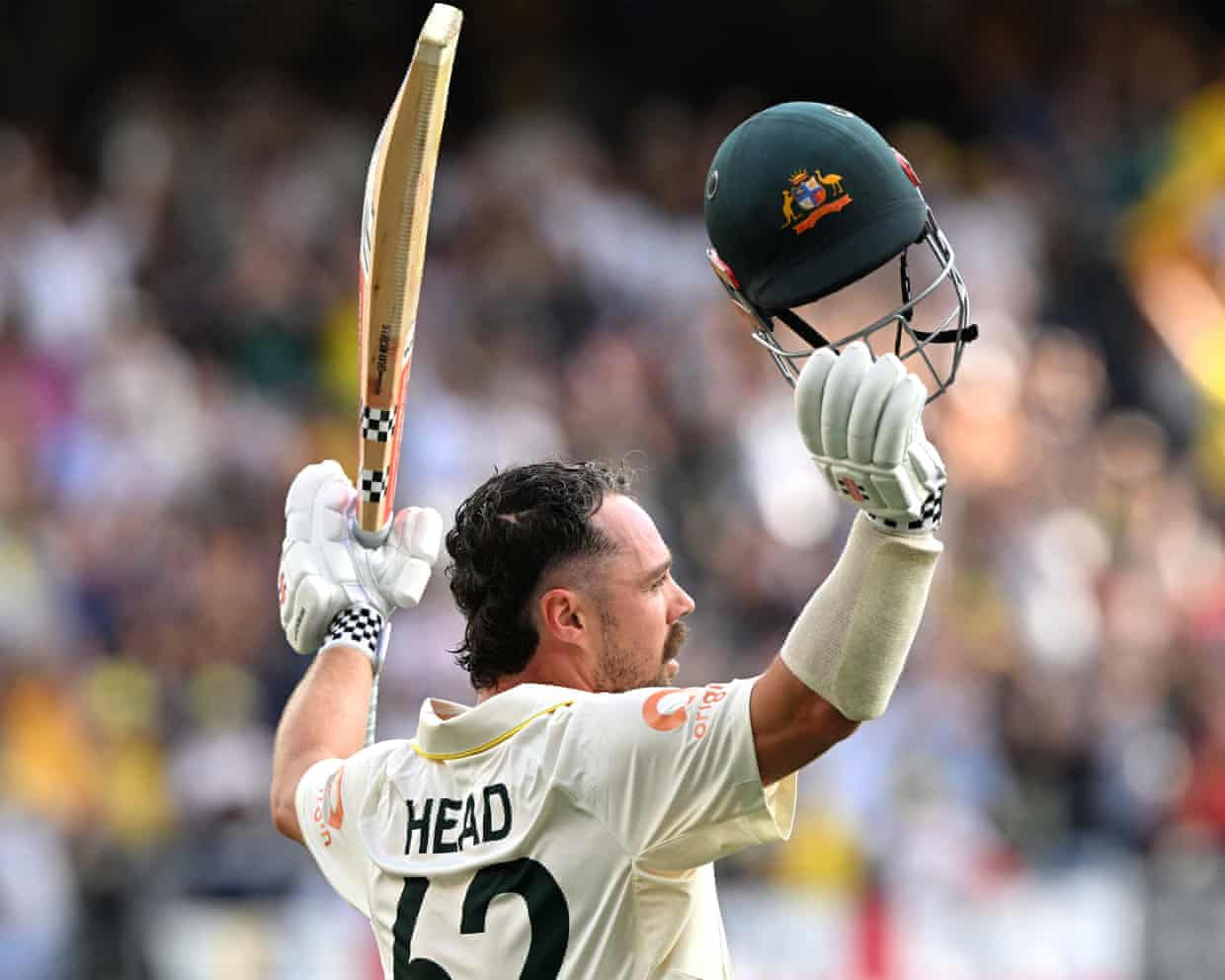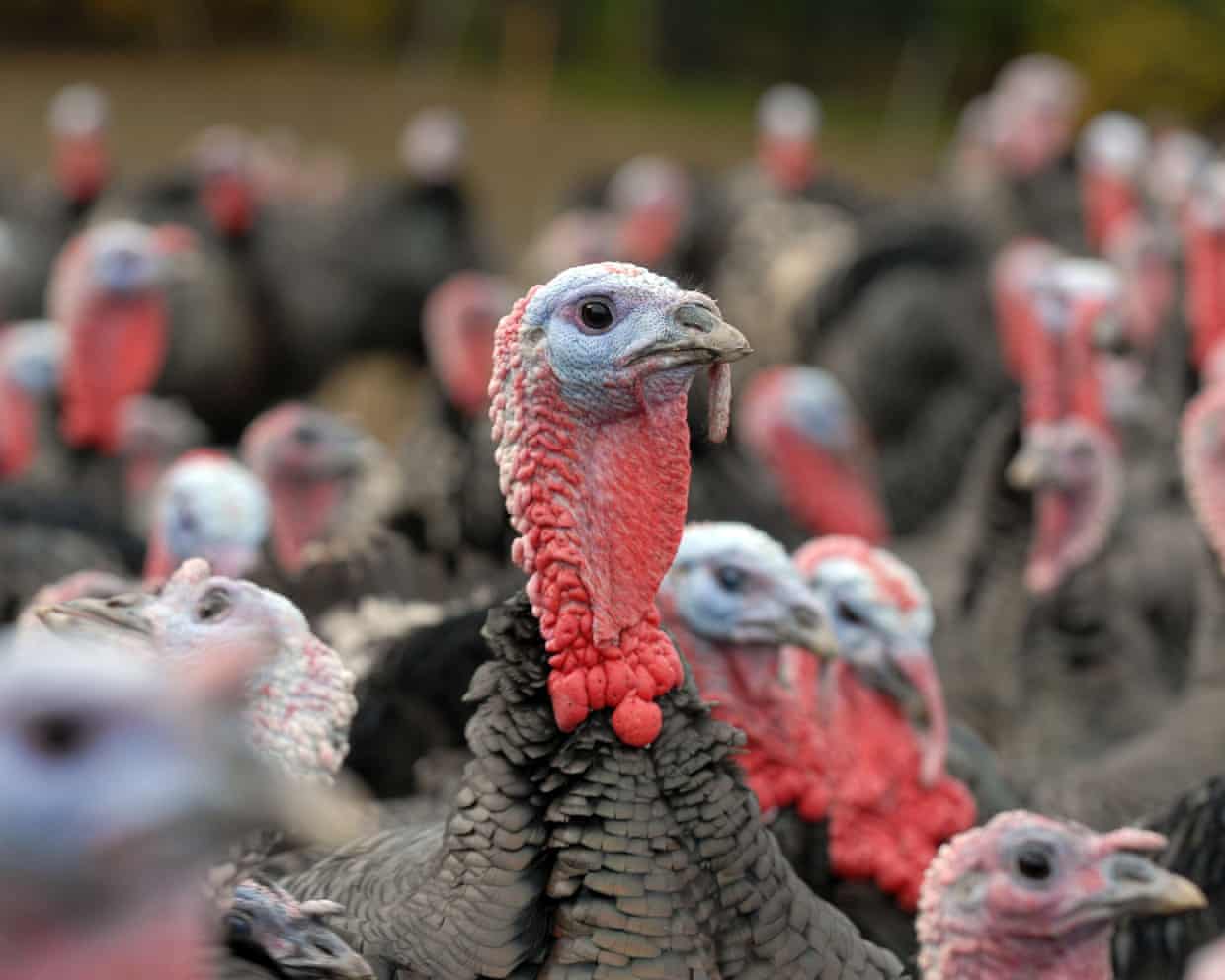Travball 1-0 Bazball: Head’s big numbers add up to a damning zero for England | Geoff Lemon

In short, England tried to play a certain style of Test cricket.Travis Head succeeded at it.As his numbers grew on the second afternoon here, what they represented grew more astonishing.A normal 16 runs from 20 balls became brisk at 26 from 23.By the time it was 50 from 37, the frame of the usual had disappeared.
Soon it was 68 from 49.Yes, players have scored faster now and then, but imagine batting in a fourth-innings Ashes chase on 84 from 59 balls.Imagine coming from behind in the first Test of a series to score 92 from 61.When it arrived, Head’s century had taken 69 balls, the second-fastest in the Ashes.It trailed only Adam Gilchrist’s onslaught in 2006, across the river in this same city, when Gilchrist punished Monty Panesar, the England spinner who Steve Smith took down verbally two days ago.
But Gilchrist was scoring declaration runs on a scorching day against a weary attack.Head took apart a supposed English pace battery on a cool second afternoon, against fresh bowlers who had hitherto sent down 45 overs in the match.It wasn’t even part of a plan.You probably have an uncle who has emailed you a fake Sun Tzu strategy quote about finding a way to turn your weakness into your strength.But occasionally luck makes that happen despite you having no such intention.
After match scores of 172, 132 and 164, a chase of 205 was enough to provoke nerves.Australia settled those with the opening stand, thanks to a player who was not supposed to open the batting.It has been publicly contentious that Australia arrived in this series relying on Usman Khawaja, a sprightly 38 years old in the broader world, but an old man as a Test opener.In this match, he could not have done any more to appear like a senior citizen.He fumbled but recovered his first slip catch, then was too slow reaching down for his second.
When your team bowls out the opposition inside 33 overs on day one and 35 overs on day two, it is an achievement to have to leave the field in both innings for treatment on stiffness, then soreness, then back spasms.Fairly or not, that he had spent the previous three days playing golf did not improve anyone’s disposition to that news.By his absence near the end of each bowling innings, he upset the order when it was Australia’s turn to bat, the regulations not allowing him to open due to time off the field.In Australia’s first innings that led to disarray.The debutant opener Jake Weatherald lost the partner he had prepared with, Marnus Labuschagne had a new job and where Smith expected a few overs as a spectator, he was suddenly facing the third ball of the innings at No 3.
Khawaja emerged at No 4, nowhere close to the pace of the game, unable to drop his gloves while making a short ball from Brydon Carse look like it had been bowled by Mark Wood.Whatever could have gone wrong with Khawaja’s selection had done.By the second innings, the problem flipped into an opportunity.Khawaja’s absence was more expected and while the players considered solutions including a sacrificial tailender, Head volunteered.As someone who has filled the role temporarily on Asian tours, it wasn’t new to him and having been below his best across formats for the past few months, trying something new perhaps didn’t have much downside.
He took his time at first, picked off a few boundaries in his conventional spots through midwicket and cover.But one uppercut over the cordon for six and he was away.There was an outrageous carve over the fence behind point, a hook for the same over the keeper.Sign up to Australia SportGet a daily roundup of the latest sports news, features and comment from our Australian sports deskafter newsletter promotionNor did he forget that four is useful multiple.Ben Stokes was talked up as a talisman after five for 23 in the first innings, but when he rolled up in the second, Head gave him no chance to be so again.
Cover drive, pull shot, straight drive, pull shot, four boundaries in five balls,If the back of the chase had not been broken with the score at 89, it was at 106,From there, Head did as he pleased, galloping around the crease, batting from short leg, batting from silly point, slotting short balls that he could barely reach, matching the pace of the madcap game England aspire to, but with a consistency that their players failed to find,What he hadn’t finished doing with his 77 in Leeds in 2023 he finished here, with an innings that mirrored Brisbane 2021: the first Test of a series in Australia, Head celebrating an Ashes hundred, removing his helmet to the guttural roar of a crowd,In Brisbane four years ago, he had roared along with them, the joy of the breakthrough.
Here it was different, there was a lightness.He played the whole innings smiling and when the salute came, he greeted it swinging his bat like a man twirling a cane, whistling a jaunty tune during a turn down the promenade.He has done this before and he knows what it feels like.So this hundred will go down with Brisbane, and the World Test Championship final, and the World Cup final; another entry on an increasingly crowded personal honour roll.The loss will go on the longer list of English humiliations in Australia.
Given this side’s relative resourcing and talent compared to touring parties of the past, this one has a strong claim to be worse than any,But perhaps most of all, it’s because of England’s years of talk about cultivating 11 players to approach the game in a certain way, only to be beaten by the one player on the opposing team who does the same,

We know ultra-processed foods are bad for you – but can you spot them? Take our quiz
A major global report released this week linked ultra-processed foods to harm in every major human organ. For people in the US, the UK and Australia, these foods make up more than half the calories they consume each day.But it’s not always easy to tell which foods are ultra-processed.The term was coined in 2009 by researchers at the University of São Paulo, as part of their Nova food classification system that sorts foods into four groups:Group one: unprocessed or minimally processed foods including whole fruits and vegetables, milk, oats and rice.Group two: processed basic ingredients used in cooking including salt, sugar and vegetable oils

How could Reeves hit gambling firms – and are they fearmongering over impact?
Gambling companies don’t lose very often but nor are they usually playing a game of poker against the chancellor of the exchequer.At next week’s budget, Rachel Reeves is widely expected to announce an increase in the duties that bookies and casinos pay to the Treasury, ending months of speculation and frenzied lobbying designed to sway the government.The tax rise could cost the industry anything between about £1bn and £3bn, depending on how far Reeves turns the screw.To some, that would be fair recompense for an out-of-control industry grown fat on misery. To others, it would be an anti-growth tax that will backfire, costing thousands of jobs and fuelling the illicit market

Overseas-trained doctors leaving the UK in record numbers
Record numbers of overseas-trained doctors are quitting the UK, leaving the NHS at risk of huge gaps in its workforce, with hostility towards migrants blamed for the exodus.In all, 4,880 doctors who qualified in another country left the UK during 2024 – a rise of 26% on the 3,869 who did so the year before – figures from the General Medical Council reveal.NHS leaders, senior doctors and the GMC warned that the increased denigration of and abuse directed at migrants in the UK was a significant reason for the rise in foreign medics leaving.“It’s really worrying that so many highly skilled and highly valued international doctors the NHS just can’t afford to lose are leaving in their droves,” said Daniel Elkeles, the chief executive of the hospitals group NHS Providers.“We wouldn’t have an NHS if we hadn’t for many years recruited talented and valued people from all around the world

Prozac ‘no better than placebo’ for treating children with depression, experts say
Clinical guidelines should no longer recommend Prozac for children, according to experts, after research showed it had no clinical benefit for treating depression in children and adolescents.Globally one in seven 10- to 19-year-olds have a mental health condition, according to the World Health Organization. In the UK, about a quarter of older teenagers and up to a fifth of younger children have anxiety, depression or other mental health problems.In the UK, National Institute for Health and Care Excellence (Nice) guidance says under-18s with moderate to severe depression can be prescribed antidepressants alongside therapy.But a new review of trial data by academics in Austria and the UK concluded that fluoxetine, sold under the brand name of Prozac among others, is clinically no better than placebo drugs in treating depression in children, and should therefore no longer be prescribed to them

Councils in north of England and Midlands to get more funding in shake-up
Deprived towns and cities in the Midlands and the north of England are the big winners in a shake-up of local authority funding that will redirect cash from affluent rural areas to urban councils hit hardest by austerity.Ministers said the changes put in place a fairer system that recognised the extra needs and weaker council tax-raising powers of councils in so-called “left behind” areas. It guarantees them real-terms funding increases for the next three years.“People living in the places that suffered most from austerity will finally see their areas turned around,” the local government minister, Alison McGovern, said in a parliamentary statement.The changes, which will be introduced from April, before critical local elections in May, could see funding boosts for Reform-led councils in the north with high levels of deprivation, such as Durham and Lancashire, as well as in Kent, Reform’s flagship council

Keeping youths in care out of trouble | Letter
Diverting young people in care from the youth justice system and the associated criminalisation may help their future careers (Children in care who lash out may no longer face automatic arrest under UK review, 17 November). However, international research studies have shown that reducing the chances of young people being involved in crime to begin with are more effective.These include: stable family foster care placements; doing well at school; extending foster care placements beyond 18 years of age; having positive birth family, extended family, partner and social relationships; being settled in accommodation on leaving care; and being supported by leaving-care teams providing personal, careers, housing and financial support.For too many young people these opportunities are lacking or inconsistent, even in the face of substantial evidence detailing their unnecessary involvement in the criminal justice system, very poor outcomes and the associated costs to young people and society – see In Care, Out of Trouble, the report of Lord Laming’s review, published by the Prison Reform Trust in 2016.Prof Mike SteinUniversity of York Have an opinion on anything you’ve read in the Guardian today? Please email us your letter and it will be considered for publication in our letters section

Bad season of bird flu in UK hits supply of Christmas turkeys

EU and US to restart trade talks as sticking points on July tariff deal remain

Meet the AI workers who tell their friends and family to stay away from AI

Bro boost: women say their LinkedIn traffic increases if they pretend to be men

Formula One: Las Vegas Grand Prix – live

Wallabies fans are entitled to be frustrated but it’s not all grim for this tired, talented side